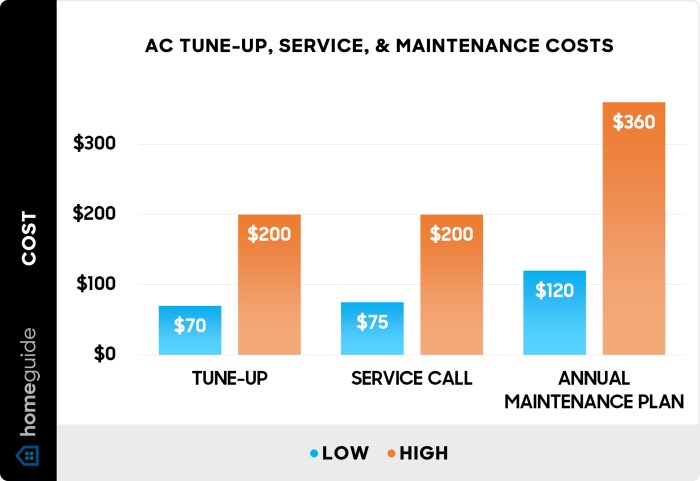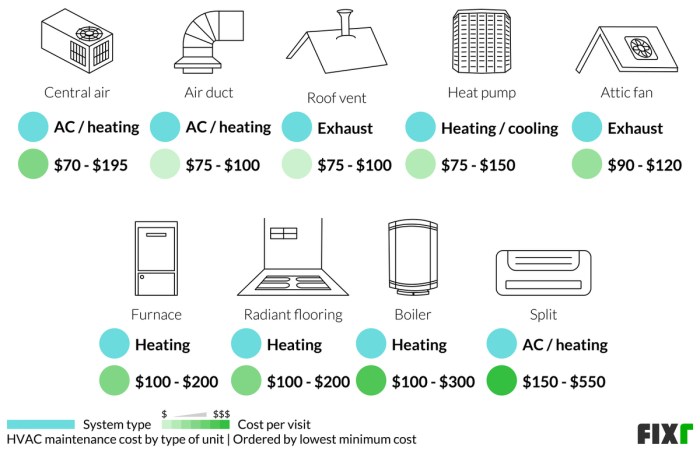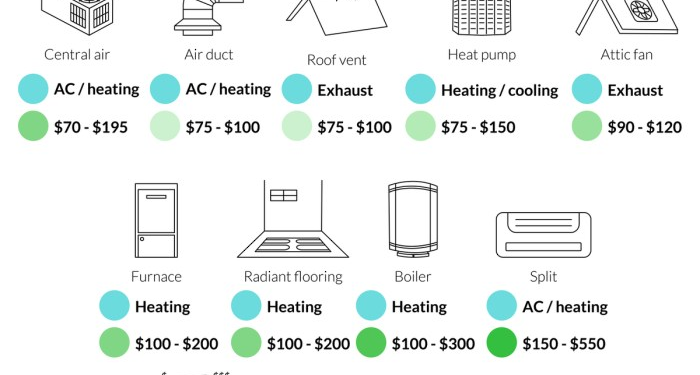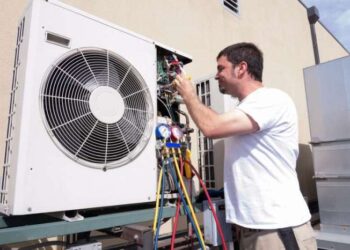Exploring the costs associated with HVAC maintenance, this introduction delves into the financial aspects of keeping your HVAC system in top condition. From the essential components to the factors influencing costs, this overview sets the stage for a detailed examination of the expenses involved in HVAC maintenance.
As we delve deeper, we will uncover the key factors that impact the cost of HVAC maintenance and explore cost-effective strategies to help you keep your system running smoothly without breaking the bank.
Importance of HVAC maintenance

Regular HVAC maintenance is crucial for ensuring the efficient functioning of your heating, ventilation, and air conditioning systems. Neglecting HVAC maintenance can lead to a variety of potential consequences that can be costly and inconvenient. Investing in routine HVAC maintenance offers numerous benefits that can help prolong the lifespan of your system and save you money in the long run.
Potential Consequences of Neglecting HVAC Maintenance
- Reduced efficiency: Dust and debris accumulation can restrict airflow, making your HVAC system work harder to maintain the desired temperature.
- Increased energy bills: A poorly maintained HVAC system consumes more energy, resulting in higher utility costs.
- Breakdowns and repairs: Neglecting maintenance can lead to unexpected breakdowns and costly repairs.
- Poor indoor air quality: Dirty filters and components can contribute to poor indoor air quality, affecting the health of occupants.
Benefits of Investing in Routine HVAC Maintenance
- Extended lifespan: Regular maintenance can help prolong the lifespan of your HVAC system, delaying the need for costly replacements.
- Improved efficiency: Proper maintenance ensures that your system operates efficiently, reducing energy consumption and lowering utility bills.
- Enhanced comfort: A well-maintained HVAC system provides consistent and comfortable indoor temperatures throughout your home or building.
- Preventive maintenance: Regular inspections and tune-ups can help identify potential issues early on, preventing major breakdowns and costly repairs.
Components of HVAC maintenance
Regular maintenance of HVAC systems involves a variety of components to ensure optimal performance and efficiency. These components play a crucial role in the overall functioning of the system and help prevent costly repairs and breakdowns.
Cleaning
- Clearing debris and dirt from air filters to improve air quality and airflow
- Cleaning evaporator and condenser coils to enhance cooling efficiency
- Removing dust and dirt from ductwork to prevent blockages and maintain air circulation
Inspection
- Checking for leaks and damage in the ductwork to prevent air loss
- Inspecting electrical connections and components for wear and tear
- Examining refrigerant levels to ensure proper cooling function
Calibration
- Adjusting thermostat settings for accurate temperature control
- Calibrating pressure and airflow levels for optimal performance
- Tuning up the system to improve energy efficiency and reduce utility costs
Factors influencing the cost of HVAC maintenance

When it comes to the cost of HVAC maintenance, several factors come into play that can impact the overall expenses. Understanding these key factors is essential for budgeting and planning for regular maintenance of your HVAC system.
Size and Type of HVAC System
The size and type of HVAC system you have installed in your property can significantly affect the maintenance costs. Larger systems typically require more frequent inspections, filter changes, and general upkeep, leading to higher maintenance expenses. Additionally, the complexity of the system, whether it's a split system, packaged unit, or ductless system, can also impact maintenance costs.
More intricate systems may require specialized maintenance procedures or more time-consuming servicing, contributing to increased costs.
Additional Services or Upgrades
Apart from routine maintenance tasks, additional services or upgrades can add to the overall cost of HVAC maintenance. Services such as duct cleaning, refrigerant top-ups, or air quality testing can increase the maintenance expenses. Upgrading components like thermostats, filters, or insulation to improve energy efficiency or indoor air quality can also come with extra costs.
While these additional services and upgrades can enhance the performance and longevity of your HVAC system, they do contribute to a higher maintenance bill.
Cost-effective strategies for HVAC maintenance
Regular HVAC maintenance is crucial for ensuring the longevity and efficiency of your system. However, the cost of maintenance can add up over time. Here are some cost-effective strategies to help you reduce the expenses without compromising on quality.
Regular Maintenance Importance
Regular maintenance helps in identifying and addressing potential issues before they escalate into costly repairs. By scheduling routine inspections and tune-ups, you can keep your HVAC system running smoothly and efficiently, ultimately saving money in the long run.
Proactive Maintenance vs. Reactive Repairs
Investing in proactive maintenance, such as changing filters, cleaning coils, and inspecting components regularly, is more cost-effective than waiting for a breakdown and having to pay for reactive repairs. By staying ahead of potential problems, you can avoid unexpected expenses and ensure your system operates at its best.
Closing Summary
In conclusion, understanding the costs of HVAC maintenance is crucial for ensuring the longevity and efficiency of your system. By implementing the cost-effective strategies discussed and staying proactive with routine maintenance, you can minimize expenses in the long run while maximizing the performance of your HVAC system.
Expert Answers
What are the key factors that impact the cost of HVAC maintenance?
The size and type of HVAC system, additional services or upgrades, and the frequency of maintenance can all influence the overall cost.
How can I reduce the cost of HVAC maintenance without compromising quality?
Regular maintenance, DIY tasks like changing filters, and investing in energy-efficient solutions can help lower costs while maintaining system efficiency.
Is proactive maintenance more cost-effective than reactive repairs?
Yes, proactive maintenance is generally more cost-effective as it helps prevent major issues that can lead to costly emergency repairs.














